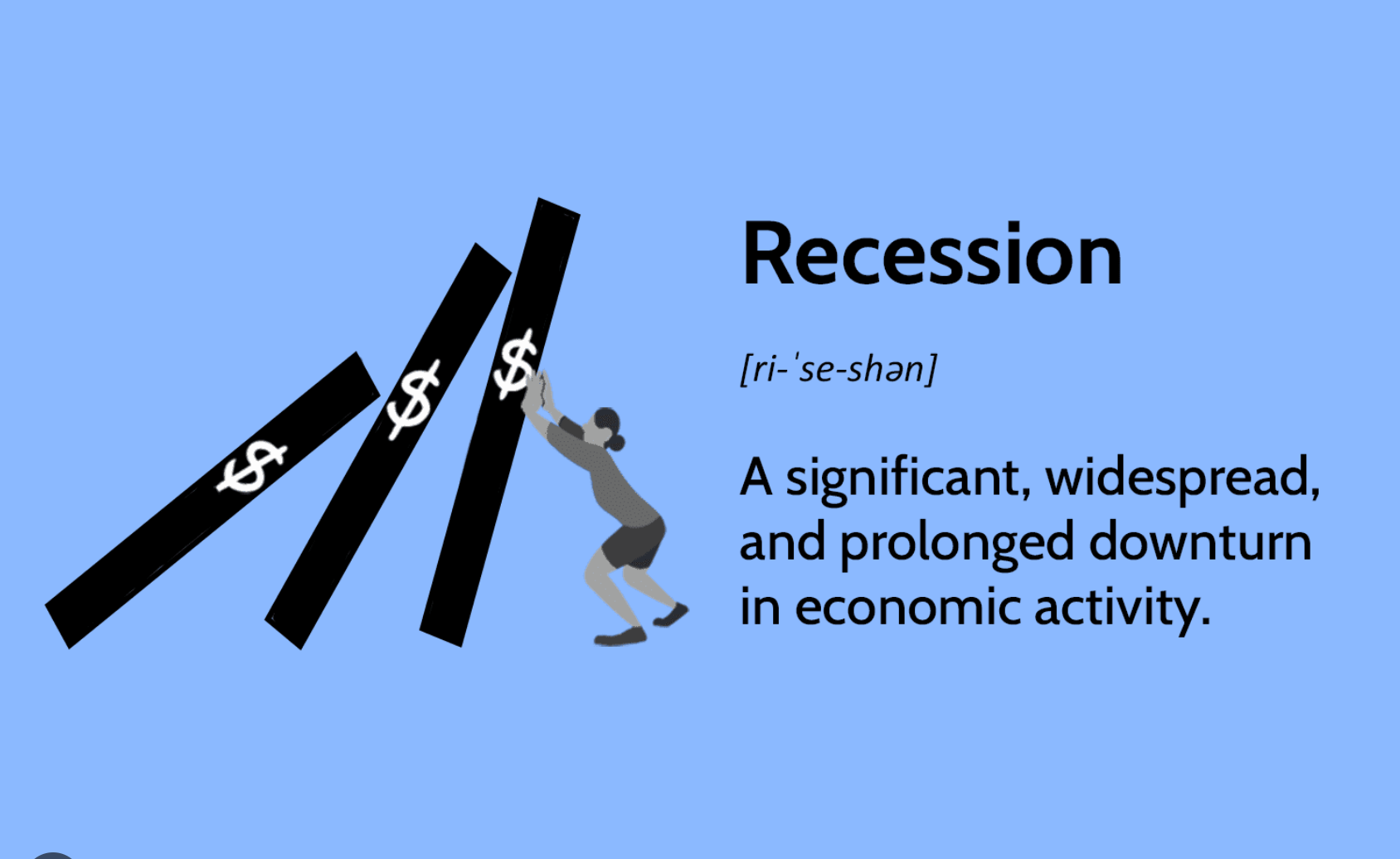When planning to purchase a new home, you might feel concerned about the potential for economic downturns to stand in your way. It’s important to be aware on how to recession-proof your home buying strategy alongside consulting a mortgage broker or financial advisor.

Where are we in the economic cycle?
In economic terms, a recession is when the economy grows less than it did in two consecutive quarters. Typical changes to look out for are higher inflation, unemployment increases, and the available jobs in the market will decrease significantly.
Many businesses and companies will close, the government will cut back on funding for services, and typically consumer demand will be low.
Recessions are all part of the economic cycle, they give the economy the chance to trim back on excess spending and streamline goods and services to be more cost-effective.
The current economic climate in Australia is putting pressure on the housing market, making it difficult for homebuyers to shop with confidence.

At different points in the economic cycle, house prices can go up or down by a lot depending on the area and demand. That’s not even taking into account how changing interest rates in response to inflation, can cause more people to cut back on spending, which slows the economy even more.
You then start seeing items that used to be consumer staples cut from household budgets. Items such as streaming services, gym memberships, and the like are cut or significantly reduced.
Auto dealerships start to record downturns in sales numbers as consumers hold off on car upgrades or purchases. Consumer sentiment is the key driver for this behaviour.
Mental health professionals start recording increases in assistance, and the government will see healthcare spending increase. Consumer staples are now very different at this point.
What can I do?
If you want to protect your investment while still purchasing a home of your own, there are steps that you can take to recession-proof your purchase. This will help you stay on top of your finances and avoid defaulting on your loan, all while living in a home you own and love!
Recession-proofing steps to follow
When it comes to tackling the potential for economic recession, it’s important that you consider simple ways to protect your finances, try to be as recession resistant as possible and navigate well through economic downturn events.
The below tips and tricks are designed to help you recession-proof your budget and your home-buying strategy.
Maintain job security
Job security is obviously a major consideration when it comes to navigating low periods in the economic cycle. This will help you maintain stable employment and a stable, reliable income to fund your home purchase or loan repayments.
Not everyone can say they work in an industry with recession proof jobs, history tells us that government regulation during periods of economic uncertainty is vital.
The most recession-proof industries are those that focus on essential services, such as cleaning, healthcare, education, and food retail.
However, if you don’t work in one of these more recession-proof industries, you can still prioritise stability by selecting a stable and professional employer with established staying power.
Maximise cash flow
During recessionary periods, maximising cash flow can help you stay in control of your finances. This may mean investing your money wisely or diversifying your income streams, including working a range of different jobs or even thinking about ideas for recession-proof businesses.
By optimising cash flow, you can ensure that your finances don’t stagnate. This can help remain steady even as the economy falters. You’ll the ability to keep money moving in and out of your accounts as normal, improving your financial mobility. An example of this may be refinancing your existing loans or changing them to interest only for a short period.
Reduce your debt
Debt can be a major factor in compromising your economic stability during a recession. The best way to recession-proof your finances is by eliminating or consolidating debts as much as possible, reducing the need for interest payments and cutting back on your regular expenses.
Whether you have bank loans, credit card bills, or other debts, it can be helpful to roll all your debts into one, where a single interest rate can be applied. With whatever money you have left over in your budget, plan to slowly back back your debts so that you can obtain outright ownership of your assets sooner.

Keep saving
During tough times, it may be difficult to keep saving money, but this can help you improve your financial security and recession-proof your funds and home-buying plan. As much as you can, continue to set money aside, saving for a home deposit or for an emergency fund if required.
By saving money even when the economy is challenging, you can set yourself up for a future of wealth accumulation. You’ll have access to the funds you need to ensure you never have to do without, and you’ll be more likely to have the chance to break into the property market sooner.
Increase liquidity
Financial liquidity is what happens when your assets can be easily converted into cash if needed. Increasing liquidity in your finance portfolio can help you recession-proof your funds by ensuring that you always have access to the money you need if an emergency occurs or if an opportunity (like an affordable dream home) presents itself.
Increasing liquidity is a great way to ensure your safety and stability in a volatile economic situation. You can apply this liquidity no matter where your assets lie, from brick and mortar investments to stock market investing, business operations, and more.
Diversify your assets
Diversifying your assets is another great way to recession-proof effectively, ensuring that you don’t put all your eggs in one basket and that you have access to new opportunities that keep your finances as safe and secure as possible. This can give you a good fallback plan if one or more of your recession-proofing strategies fails.
When a recession seems likely and you have funds available, it’s a good idea to consider investing in new channels and avenues, spending funds in various locations instead of limiting yourself to one investment. This means that you’ll be protected even of the value of one of your investments experiences a temporary fall.
Create a budget
Good budgeting skills are key if you want to create a recession-proof strategy. Learning to budget effectively can help you manage your income and expenses in a way that supports your goals and helps you save money where you can so that you continue building your wealth over time.
Before you buy something new, consider whether it is an absolute necessity. Think about dollar tree purchases and other cuts you can make to limit the amount you spend.
By tightening your budget and reducing regular expenses, you can develop a recession-resistant approach that helps you look towards the future and a long investment timeline.
Buy and hold real estate
Even during a recession, owning real estate is often the best investment you can choose! You can recession-proof your lifestyle by purchasing properties, knowing that bricks and mortar investments are less risky.
If you own property that you can afford, you can feel confident in your ability to move through a recessionary time period easily. Even if your property experiences a drop in value, over time, that value will circle back around and rise again, potentially even becoming higher in value than the purchase price you paid.
Speak to the experts for home loan advice
If you’re looking to get into the property market or purchase a new home during this stage in the economic cycle, check out our recommended mortgage brokers in Sydney and Melbourne.
How can they help?
The recommended and experienced mortgage brokers can offer informed industry advice to arm you with the information to guide you so you can invest wisely and make effective decisions that support your long-term home ownership goals.
Similarly, by working with a mortgage broker, you can get assistance to explore a range of home loan options and packages.
This way, you can develop a comprehensive understanding of what’s available, allowing you to choose the lowest interest rates and the best mortgage features.
Summary
Even when times are tough, purchasing property doesn’t have to be off the table. In fact, buying a new home can actually help you save money and tackle recession conditions with greater confidence.
By focusing on the recession-proofing steps you can take to protect and maximise your finances while looking after your health and well being, you can plan to get into your own home and break the renting cycle. Start spending less while paying off your own assets!

TORI DUNLAP
Tori is a finance blogger and researcher at OurTop10.com.au, where she enjoys helping people navigate the world of finance and money. Through her insightful articles and comprehensive research, she empowers readers with valuable knowledge on budgeting, saving, investing, and retirement planning.
Tori’s approachable and empathetic style makes complex financial concepts relatable and easier to understand, She aims to foster a sense of community and leave a lasting, positive impact on her audience’s financial well-being.
